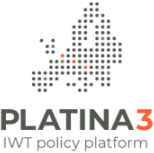Executive summary
This document is taking stock of the current situation of refresher classes in European inland navigation in general and more specifically of refresher classes for more automated vessel operation in inland navigation in Europe. This exercise on more automated vessel operation, in line with PLATINA3[1] deliverable D3.3 and based on the sector consultation during the first Platina3 stage event is focussing on remote controlled and remotely assisted vessel operation. Even though remote vessel operation and remote assistance are not automatically linked to automation, stakeholders including decision makers in the some of the largest companies in the sector are currently investing in remote vessel operation and start to train their personnel in the domain of cooperation between remote control center and crew on board remotely assisted or remotely controlled vessels.
For reasons of clarity, automation is looked at on the basis of the internationally accepted levels of automation in IWT introduced by the Central Commission for the Navigation of the Rhine (CCNR). Even if remote controlled vessel operation is not necessarily automated vessel operation, remote controlled vessel operation is in the focus of this report due to practical relevance of new competences of remote vessel operators and personnel on board remotely controlled or remotely assisted vessels as described in deliverable 3.3 and currently discussed in CESNI, i.e. on a level of automation 2 and 3 which is the most common practice when looking at the most comprehensive overview of pilot projects on automation as permanently updated on the CCNR website.[2]
The present report compares the situation in the sector of inland navigation transport (IWT) with other modes of transport that are often more advanced in terms of mandatory or voluntary refresher classes in general and more precisely in more automated transport operation. This overview leads to the assumption that IWT could fall behind other modes of transport in terms of attractiveness for newcomers to the transport sector who wish to be part of a lifelong learning environment and attractive job opportunities that provide for upskilling where need be.
Some concrete subjects for updating of CESNI standards for competence are then looked at with regard to modern technology for more automated vessel operation. As the competence standards have just been introduced in early 2022, this report focuses more on new competences for more automated vessel operation that have been identified in Platina3 deliverable 3.3 (Report on competences to operate on board systems allowing for automation of inland navigation vessels) submitted on 31 August 2022.
Based on these general findings, this document is proposing a general scheme for refresher classes for two key target groups of deck crew members operating more automated vessels, who are:
- experienced crew members already sailing on board IWT vessels since a long time
- crew members who have recently joined the IWT sector, on operational level (OL, i.e. boatman, able boatman and helmsman) and management level (ML, i.e. boatmaster)
This document provides as well a brief outlook on modern training methods and techniques. Legislators will have to decide if the proposed options for such training will be established and what preconditions will have to be considered. This will largely depend on the judgement of CESNI Member States, in the respective police regulations, if vessels will be allowed to sail without a person holding a certificate of qualification as a boatmaster onboard and if so, if the person onboard a remotely operated or remotely assisted vessels can be an able boatman with specific additional competence (and qualifications such as a radio operator’s certificate, which is only required by persons holding a certificate of qualification of helmsman or as a boatmaster).
[1] PLATINA3 1st Stage Event, the “Budapest sessions” on 7 & 8 April 2021. Programme and presentations available on https://platina3.eu/event/budapest/
[2] https://automation.ccr-zkr.org lists 37 pilot projects (state 6 October 2022) in a four language (DE, EN, FR, NL) overview of projects mostly coming from CCNR Member States (BE, CH, DE, FR, NL), Scandinavian countries (FI, NO, SE) and the UK.

